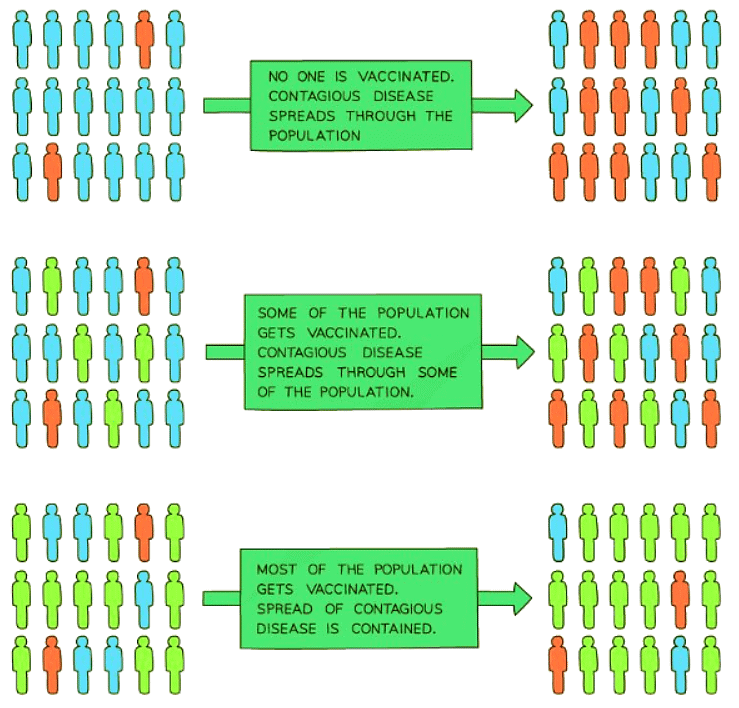Class 10 Exam > Class 10 Notes > Biology for GCSE/IGCSE > Preventing the Spread of Disease
Preventing the Spread of Disease | Biology for GCSE/IGCSE - Class 10 PDF Download
Preventing the Spread of Disease: Extended
- When a significant portion of the population is vaccinated, it shields the entire community from widespread infection because there are limited opportunities for the pathogen to propagate—it can only do so if it infiltrates the body of an unvaccinated individual.
- This protective phenomenon is termed herd immunity.
- However, if vaccination rates decline within a population, it exposes the remaining individuals to heightened risks of widespread infection, as they are more likely to encounter contagious, infected individuals. This escalation in infections amplifies the likelihood of fatalities stemming from a particular infectious disease.
Herd Immunity


- Herd immunity is a crucial concept that prevents epidemics and pandemics from spreading within populations.
- Herd immunity plays a vital role in preventing the widespread occurrence of diseases within a community.
- It is achieved when a significant portion of the population becomes immune to a disease, either through vaccination or prior illness, making it difficult for the disease to spread.
- By immunizing a large number of individuals, especially children who are more susceptible, the entire community benefits from reduced disease transmission.
- Vaccination programs are designed not only to control diseases but also to eradicate them completely in some cases.
- An excellent example of successful disease eradication through vaccination is smallpox, which was officially declared eradicated in 1980 thanks to a global vaccination campaign led by the World Health Organization.
Key Points
- Herd immunity prevents epidemics and pandemics by increasing immunity levels in the population.
- Vaccination of children is crucial for maintaining herd immunity as they are regularly in contact with others and can easily spread diseases.
- Vaccination programs aim not only to control but also to eradicate dangerous diseases like smallpox.
Question for Preventing the Spread of DiseaseTry yourself: What is the purpose of achieving herd immunity?View Solution
The document Preventing the Spread of Disease | Biology for GCSE/IGCSE - Class 10 is a part of the Class 10 Course Biology for GCSE/IGCSE.
All you need of Class 10 at this link: Class 10
|
101 videos|193 docs|33 tests
|
FAQs on Preventing the Spread of Disease - Biology for GCSE/IGCSE - Class 10
| 1. What is herd immunity? |  |
Ans. Herd immunity occurs when a large portion of a community becomes immune to a disease, making the spread of disease from person to person less likely. It helps protect those who are not immune to the disease.
| 2. How can herd immunity be achieved? |  |
Ans. Herd immunity can be achieved through vaccination programs, where a large percentage of the population is vaccinated against a particular disease. This helps prevent the spread of the disease and protects those who are unable to be vaccinated.
| 3. What are the benefits of herd immunity? |  |
Ans. The benefits of herd immunity include protecting vulnerable populations who cannot be vaccinated, reducing the overall spread of disease in a community, and potentially eradicating certain diseases.
| 4. Can herd immunity be maintained indefinitely? |  |
Ans. Herd immunity can be maintained indefinitely as long as a high percentage of the population remains immune to a particular disease. However, it is important to continue vaccination efforts and public health measures to prevent outbreaks.
| 5. What role do individuals play in achieving herd immunity? |  |
Ans. Individuals play a crucial role in achieving herd immunity by getting vaccinated, following public health guidelines, and staying informed about the importance of vaccination in preventing the spread of disease.
Related Searches















